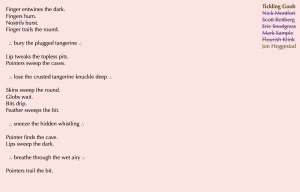DHSI is too much fun. This past week, I was fortunate enough to work with two amazing scholars of electronic literature: Astrid Ensslin and Davin Heckman. In going into their course, I’d only casually brushed up against forms of electronic literature (with Twine, an individual platform, being an exception to my otherwise novice understanding).

Screenshot from Jason Nelson’s Nothing You Have Done Deserves Such Praise.
Over the course of the week, Astrid and Davin introduced me (and the rest of our fun, but smallish group) to an overview of the field of electronic literature, an exciting field that, like queer theory, resists categorization. In the case of e-lit, this is because tools and texts are expanding the possibilities for e-lit faster than they can be classified.
After providing this foundation, Astrid and Davin then leaped into familiarizing the class with a number of e-lit works. These can include proto-digital texts (like medieval manuscripts), generative texts (like The Deletionist and Taroko Gorge), interactive fiction (as seen in many Twines, although IF is completely text-based, so not all Twines qualify), netprov (Machine Learning Breakfast Club), hypertext fiction (Patchwork Girl), literary games (Nothing You Have Done Deserves Such Praise), and the list goes on!
“Literature is a game with tacit conventions; to violate them partially or totally is one of the many joys (one of the many obligations) of the game, whose limits are unknown.”
– Jorge Luis Borges, 1943
As a class, we discussed the benefits of incorporating electronic literature into our teaching, and I found that it would be especially useful for future iterations of writing courses. Netprov not only requires a high level of creativity, for example, but it also might be used as a means of illustrating voice or style. Additionally, it’s a fun way (really, it is!) to get students excited about our read-write culture.
Expanding on this last idea, I found that I personally got the most excited in this course as I experimented with the coding of earlier projects available online. Immersing ourselves in the creation of our own electronic texts, I created my own iterations of poems based off of three of Nick Montfort’s earlier works. These poems were not only fun to make, but illustrated the benefits of immersing one’s self in a read-write culture while offering an introduction to the field of coding.
Playing off of Montfort’s Taroko Gorge, I originally intended Tickling Goob to do something quite different than it does. But in experimenting with the code, I ended up making something that doesn’t take itself seriously at all. There’s certainly a place for this in a pedagogy of play, but it’s also just fun. And that’s okay!
Men Love, Let All builds off of Montfort’s Permutation Poems, which, in turn, build off of Brion Gysin and Ian Sommerville’s works. The poem that’s generated is deterministic, displaying all of the possible permutations of the words in the title, proposing a wide array of phrasing queer desire in the process.
Lastly, DHSI 2020 AD takes Monfort’s Star Wars One Line at a Time and considers how one might use it to create a visual product with only basic html coding.


